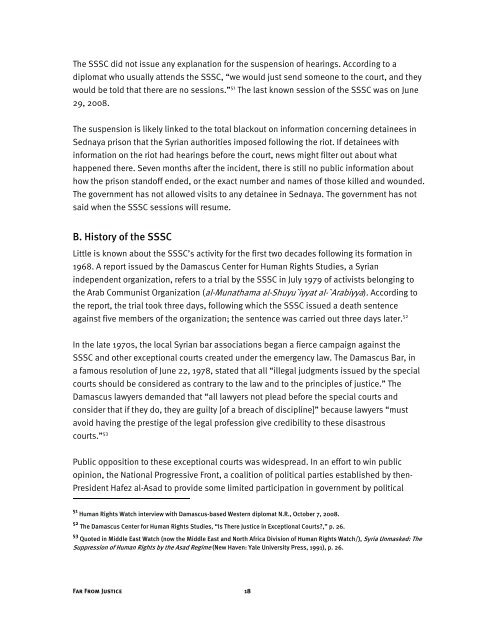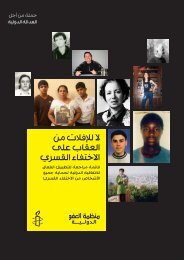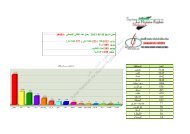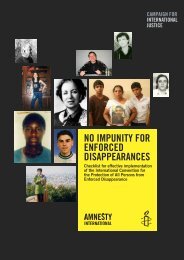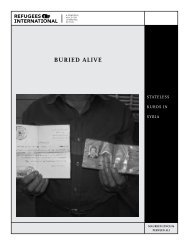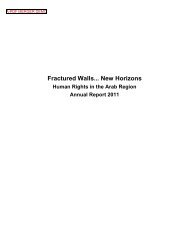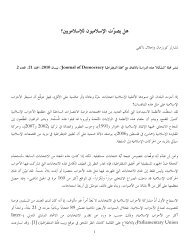Far From Justice - Human Rights Watch
Far From Justice - Human Rights Watch
Far From Justice - Human Rights Watch
- No tags were found...
Create successful ePaper yourself
Turn your PDF publications into a flip-book with our unique Google optimized e-Paper software.
The SSSC did not issue any explanation for the suspension of hearings. According to adiplomat who usually attends the SSSC, “we would just send someone to the court, and theywould be told that there are no sessions.” 51 The last known session of the SSSC was on June29, 2008.The suspension is likely linked to the total blackout on information concerning detainees inSednaya prison that the Syrian authorities imposed following the riot. If detainees withinformation on the riot had hearings before the court, news might filter out about whathappened there. Seven months after the incident, there is still no public information abouthow the prison standoff ended, or the exact number and names of those killed and wounded.The government has not allowed visits to any detainee in Sednaya. The government has notsaid when the SSSC sessions will resume.B. History of the SSSCLittle is known about the SSSC’s activity for the first two decades following its formation in1968. A report issued by the Damascus Center for <strong>Human</strong> <strong>Rights</strong> Studies, a Syrianindependent organization, refers to a trial by the SSSC in July 1979 of activists belonging tothe Arab Communist Organization (al-Munathama al-Shuyu`iyyat al-`Arabiyya). According tothe report, the trial took three days, following which the SSSC issued a death sentenceagainst five members of the organization; the sentence was carried out three days later. 52In the late 1970s, the local Syrian bar associations began a fierce campaign against theSSSC and other exceptional courts created under the emergency law. The Damascus Bar, ina famous resolution of June 22, 1978, stated that all “illegal judgments issued by the specialcourts should be considered as contrary to the law and to the principles of justice.” TheDamascus lawyers demanded that “all lawyers not plead before the special courts andconsider that if they do, they are guilty [of a breach of discipline]” because lawyers “mustavoid having the prestige of the legal profession give credibility to these disastrouscourts.” 53Public opposition to these exceptional courts was widespread. In an effort to win publicopinion, the National Progressive Front, a coalition of political parties established by then-President Hafez al-Asad to provide some limited participation in government by political51 <strong>Human</strong> <strong>Rights</strong> <strong>Watch</strong> interview with Damascus-based Western diplomat N.R., October 7, 2008.52 The Damascus Center for <strong>Human</strong> <strong>Rights</strong> Studies, “Is There <strong>Justice</strong> in Exceptional Courts?,” p. 26.53 Quoted in Middle East <strong>Watch</strong> (now the Middle East and North Africa Division of <strong>Human</strong> <strong>Rights</strong> <strong>Watch</strong>/), Syria Unmasked: TheSuppression of <strong>Human</strong> <strong>Rights</strong> by the Asad Regime (New Haven: Yale University Press, 1991), p. 26.<strong>Far</strong> <strong>From</strong> <strong>Justice</strong> 18


